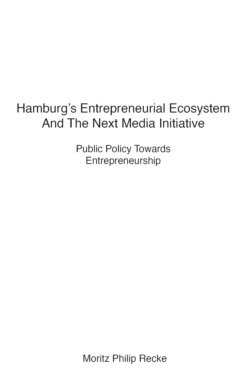Читать книгу Hamburg's Entrepreneurial Ecosystem And The Next Media Initiative - Moritz Philip Recke - Страница 15
На сайте Литреса книга снята с продажи.
3.2 Venture Capital Activity in Hamburg
ОглавлениеWith around EUR 300 million of venture capital investments in 2015, Hamburg is the 5th strongest VC location in Europe and 2nd in Germany (Ernst & Young 2016). Interestingly, the average deal size in Hamburg is EUR 10.57 million and about the same as in Berlin with EUR 10.46 million, while Munich has a much smaller average deal size of EUR 3.89 million (see table 13).
This could indicate that Hamburg is about as prospering in terms of VC funding as Berlin, just at another level of deal volume. In fact, the growth of Germany’s entrepreneurial ecosystems outpaced other European regions in terms of VC investments for years and is driven particularly by Berlin, Hamburg and Munich (Ernst & Young 2015).
Among the top 5 startups in terms of funding in Germany, 2 are based in Hamburg. Gaming company Bigpoint, founded in 2002, received a total funding of USD 461 million and FinTech company Kreditech, founded in 2012, received total funding of USD 355 million as of September 2015 (see table 14).
Most of these investments are growth or later stage investments, usually done by investors from the UK, the U.S. and Asia. The largest investors according to Ernst & Young (2015) data are Kite Ventures, Phenomen Ventures, DN Capital, Insight Venture Partners, Blumberg Capital, Kreos Capital and Luxor Capital. Financing instruments used are both equity and venture dept. German later stage investments were done through venture capital firms such as Earlybird, Lakestar, Holtzbrinck Ventures and Rocket Internet among others. Prominent investment banks such as Goldman Sachs are also active in Germany. All of these international investment activities indicate the growing attractiveness of Germany’s entrepreneurial ecosystems (Ernst & Young 2015).
Looking at investments done in Hamburg specifically over the last years, the number of investors active regionally still is much smaller than in Berlin. Ernst & Young (2015) lists 36 key investors in Hamburg opposed to 110 in Berlin. This number might not be that indicative though, since it is unclear wether this data really indicates venture capital investment activity in Hamburg or is only linked to investors being stationed in Hamburg. The actual number of active investors might be very different and probably much higher since both national and international investors who invest in Hamburg based startups are not included in the list.
In any case, the data shows that Hamburg’s entrepreneurial ecosystem is both thriving and attractive to both national and international investors, underlined by the biggest European VC funding in Q2 2016 - a USD 46 million series C round investment in Hamburg based startup Finanzcheck (KPMG & CB Insights 2016).
Among so called “unicorn” startups, companies with a valuation of over USD 1 billion, one is from Hamburg, four are from Berlin according to Ernst & Young (2015) data for 2015. Among four additional startups on their way to achieve this valuation, one company is from Hamburg while all others are from Berlin (see table 15). Rocket Internet could be excluded from this list since it actually is an incubator - investing in various startups and therefore not necessarily qualifying as an high-growth startup itself - making XING one of four “unicorn” startups in all of Germany.
Clearly, Berlin is the number one entrepreneurial ecosystem in Germany, proven not only by media attention but startup rate (Metzger 2015), active investors, company valuations (Ernst & Young 2015) and investment volume (Ernst & Young 2016). At the same time, Hamburg arguably is second with no other location in Germany catching up.
